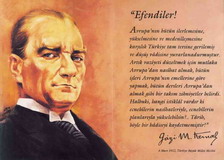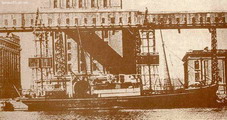 War of Independence...
It was the 13th of November 1918. Istanbul was overcast with dark clouds reflecting the mood of the people
who were down and out. The Ottomans had lost World War I and allied navy had anchored in the harbor. The city was
unofficially occupied. Haydarpasa was the western terminus of the Istanbul - Baghdad railway. A young handsome general
got off the train and took one of the little boats the Turks called "Çatana", to cross the Bosphorus.
We talked about Turkish history in the previous chapters. Among the various states the Turks had founded, the most
important, the largest and the longest lasting was the Ottoman Empire which, between the 14th and the
19th centuries, established a "Pax Ottomana" on three continents ruling over many nations. The Ottomans who
entered their period of decline in the 18th century took part in the First World War on the side of the Axis
Powers. On October 30th,1918 they signed the Mudros Armistice which had heavy terms that spelled, in brief,
unconditional surrender. On the 13th of November, allied battleships and cruisers anchored in the Istanbul
harbor.
That same day, Mustafa Kemal, a full - general at the age of 37, the brilliant tactician of the Dardanelles and other
fronts, disembarked from the train which brought him back home from the southern front. Passing between the warships
of a mighty armada which had anchored in the harbor, his face was tired but his eyes shone as usual with their penetrating
brilliance. Addressing his adjutant, he said :
War of Independence...
It was the 13th of November 1918. Istanbul was overcast with dark clouds reflecting the mood of the people
who were down and out. The Ottomans had lost World War I and allied navy had anchored in the harbor. The city was
unofficially occupied. Haydarpasa was the western terminus of the Istanbul - Baghdad railway. A young handsome general
got off the train and took one of the little boats the Turks called "Çatana", to cross the Bosphorus.
We talked about Turkish history in the previous chapters. Among the various states the Turks had founded, the most
important, the largest and the longest lasting was the Ottoman Empire which, between the 14th and the
19th centuries, established a "Pax Ottomana" on three continents ruling over many nations. The Ottomans who
entered their period of decline in the 18th century took part in the First World War on the side of the Axis
Powers. On October 30th,1918 they signed the Mudros Armistice which had heavy terms that spelled, in brief,
unconditional surrender. On the 13th of November, allied battleships and cruisers anchored in the Istanbul
harbor.
That same day, Mustafa Kemal, a full - general at the age of 37, the brilliant tactician of the Dardanelles and other
fronts, disembarked from the train which brought him back home from the southern front. Passing between the warships
of a mighty armada which had anchored in the harbor, his face was tired but his eyes shone as usual with their penetrating
brilliance. Addressing his adjutant, he said :

"Don't worry young man. They shall go the way they came."
The National War...
Emerging defeated from the First World War, the Ottomans were forced to sign an armistice embracing the most onerous
conditions, whereby the Anatolian Peninsula, that had been the Turkish homeland for a thousand years, was divided up
and subjected to imperialistic designs. The economy was a shambles, and from every standpoint the Ottoman society was
in ruins and in collapse. Seemingly there was no hope. The views expressed at the Paris Peace Conference in 1919 were
that Türkiye would be divided up. But one thing had been forgotten, and that was that the Turks had founded one of the
world's most powerful states with Anatolia at its core. Another fact was that the Turks had an ancient and deeply rooted
past.
These facts, plus the fact that a people who had lived for centuries on this soil could not be dissolved, had to be made
known to the world. To this end associations were founded in various parts of the country, and patriotic citizens did
their best to organize. But meanwhile in the Aegean region the Greek Army was advancing swiftly, equipped by Great Britain
with the most modern weapons of the day, the French were rapidly occupying in southeastern Anatolia and in the east the
Army of the Armenian Republic was advancing. The Ottoman government, implementing the terms of the armistice, was against
any form of resistance on the grounds that it would "anger" the enemies. What was to be done ?
Mustafa Kemal Pasha knew what had to be done. His thinking ran along these lines. "The Ottoman Empire, which lasted more
than six hundred years, has come to the end of its natural lifespan. It is dead, and the dead cannot be revived. The
Ottoman governments have no power or decisiveness. Therefore the Turkish nation must decide its own fate and map its own
future. The only path to this goal is the founding of a new state based on the sovereignty of the nation. If the nation
unbinds the knots that have held it for centuries, and establishes unity, it can save the homeland".
It soon became apparent just how correct this strategy was. On his return from the front to Istanbul, Mustafa Kemal Pasha
realized the hopelessness of the situation, and that the time had come to put into action the plans he had nourished since
his youth. He decided to go into Anatolia and pursue the struggle from there. In the early months of 1919 Anatolia was a
hotbed of troubles, and Mustafa Kemal requested that the government assign him to go and deal with them. This request was
accepted, and he left Istanbul with this understanding. On May 19th, 1919 he set foot in Samsun. Mustafa Kemal
Pasha was now in Anatolia, to unite it and reconcile antagonistic factions.

His first step would be to bring about the congresses he had planned, one by one. An association known as the Legal Society
for the Defense of Anatolia and Rumelia wanted the Ottoman Parliament to convene and establish peace conditions, but in
this matter Mustafa Kemal was not hopeful. Nevertheless the Parliament, in the National Oath of January 28th,
1920, asked for an honorable peace in which all borders were removed that threatened the territorial integrity of Türkiye.
Only if this condition were met could peace talks be held.
The Entente Powers, who had thought the Eastern Question was resolved, were greatly disturbed by this action taken under
the influence of the Anatolian National Movement, and in their anger occupied Istanbul on March 16th,1920. Thus
for the first time in 467 years the city no longer had the status of Ottoman capital. Not long before this, on December
27th, 1919, Ankara had been made the center of national resistance, and it was now time to found a National
Parliament. On April 23rd,1920, a National Assembly deriving its authority from the nation held its opening
session, and by an unanimous vote Mustafa Kemal was chosen to preside.
In order to carry out their project of dividing Anatolia, the Entente Powers wished to extinguish the movement, which
in their view was not serious. They therefore dictated the final peace of the First World War, the Peace of Sevres (August
10th, 1920), which the Ottoman government was forced to sign. Under the terms of this peace, all of eastern
Thrace, plus Izmir and the Aegean region, were ceded to Greece. The straits were to be managed jointly, without the
participation of the Turks. In addition, a large part of the country's eastern territory was ceded to Armenia, which
had been established in Russia. Southern Anatolia was to be settled by French, Italian and British populations, so that
only a small Ottoman State was left in Anatolia.
This peace roused the patriotic fervor of the Turks even more, and the youthful army of the new state began to win its
first victories. The Armenian army, which had occupied Eastern Anatolia at the end of World War I, was expelled from these
territories and signed a peace at Gümrü on December 3rd, 1920, while the progress of the Greeks, who had set
their sights on Ankara, was brought to a halt. The first diplomatic contacts with the new Turkish state now began to be
made, as the Soviet Union, impressed by the victories we have cited, signed an aid agreement at Moscow on March
16th, 1921. Meanwhile the French advance in the southeast was put to a definitive halt by the brave Turkish
militia.
These developments led Greece, at the instigation of Great Britain, to prepare a major new offensive, and they advanced
as far as the Sakarya River near Ankara. Meanwhile the National Assembly was temporarily relieving Mustafa Kemal of his
powers so that he could devote his attentions to the war as Commander in Chief. The Greeks renewed their offensive on
August 23rd, 1921, and were repulsed on September 13 after 22 days and nights of fighting in which no quarter
was given. With this victory, a thousand years of the Turkish presence in Anatolia were confirmed.
After this victory won with the meagerest of means, the French signed a peace with Ankara on October 20th,
1921, while the Italians also evacuated from the territory they had occupied. This left the Greeks and British alone.
The following year, in September, 1922, the Greeks were expelled from Anatolia as the result of a grand Turkish offensive.
The British were determined to remain in eastern Thrace and the straits at all costs, but thanks to the wise policies of
the Turkish government they found themselves isolated. They were thus compelled to sign an armistice, at Mudanya on October
11th, 1922. There was all the difference in the world between this armistice and that of Mudros signed some four
years previously. After his victory at the Battle of the Sakarya, Mustafa Kemal was given the rank of Marshal by the
National Assembly and in addition was awarded the title of Gazi. This title is reserved by the Islamic world for only its
greatest heroes.
Mustafa Kemal Pasha wanted to sign a peace which would confirm the independence and freedom from conditions of the new
Turkish state, while the Allies, preparing to meet in Lausanne, aimed for an agreement which would take the Treaty of
Sevres as its model, even though the National Assembly did not recognize this treaty. In order to divide the Turks at
the conference, the Entente Powers had also invited the Istanbul government. This was taken as an outrage by the National
Assembly, which had no choice but to legally dissolve the Ottoman Sultanate. This they did on November 1st,
1922. Thus the Ottoman Sultanate, which had already expired in fact, legally too became a thing of the past. Henceforward
there was only one government in Türkiye, that founded by the National Assembly.
The Turkish state was represented at Lausanne by a national hero, Ismet Pasha (Inönü). The Turkish delegation stood alone,
for England, France and their allies had formed a common front in order to preserve their interests. There was no one to
back Türkiye's cause, so that Ismet Inönü and the rest of the delegation were compelled to wage a diplomatic battle like
that of the Sakarya. The peace signed at Lausanne on July 24th, 1923, put an end to the centuries - old Eastern
Question, and gave the new Turkish State complete independence. The forces of occupation in Istanbul, which had arrived on
November 13th, 1918, departed on October 2nd, 1923, saluting the Turkish flag as they left.





